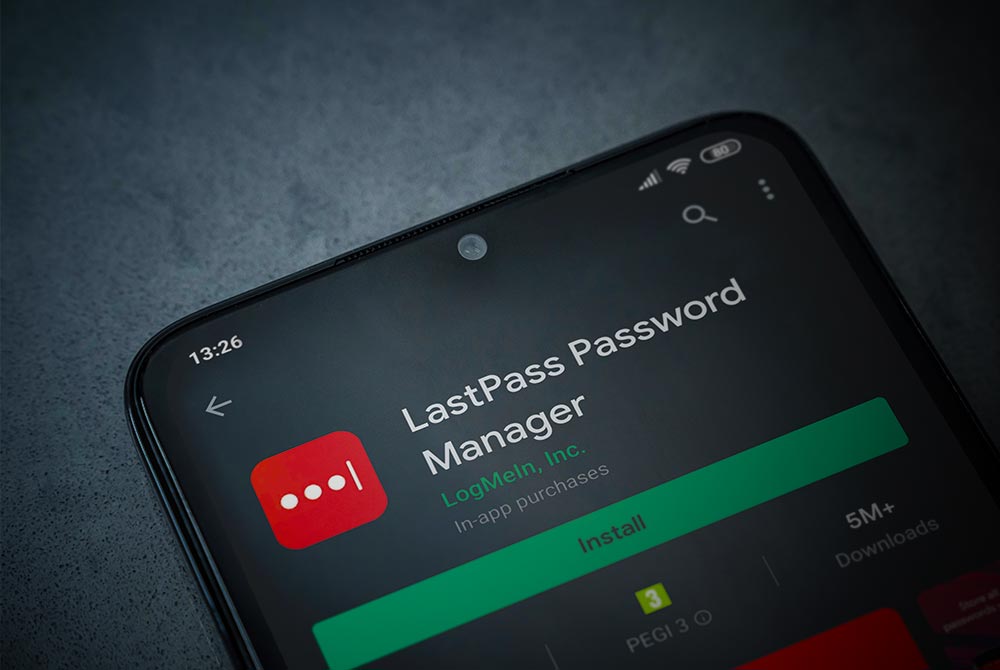
Most Read

Best Password Managers for 2023: Editor's Picks

Real or Fake Apple Watch? 8 Ways to Tell the Difference

Real vs. Fake AirPods Pro—9 Ways to Tell the Difference

Fake AirPods: How to Spot Real Apple AirPods from Counterfeits

How to Check if an App is Safe to Download
LastPass Password Manager In Depth
LastPass is a password manager and form-filler that allows you to store all of your passwords and other sensitive information securely in one application. Information is stored on the cloud so you can access it from anywhere—from your browser, cell phone, or computer.
LastPass became a popular password manager quickly by using a freemium model where anyone could sign up for a free account but got more features with a subscription. In 2015, they were acquired by LogMeIn and in 2016, they added a free two-factor authenticator to their product line.

- Free unlimited password storage.
- Multifactor authentication options.
- Dark web monitoring.
How LastPass Protects You
LastPass makes password security convenient. Here are the ways that LastPass protects you and your data.
Generates Strong Passwords
With LastPass, you don't have to worry whether your password is secure enough. You can have the app generate a password using every possible random character up to 99 characters long. LastPass will detect password fields in web forms and mobile apps, and give you the option to generate a password right there.
Supports Multifactor Authentication
LastPass uses one master password to store all of your other passwords, so if someone has your master password, they could access every one of your internet accounts. But you can set up multifactor authentication in LastPass so that you not only need the master password but a code sent either via text message to your phone or to a software-based two-factor authentication (2FA) app like Google Authenticator.
Password Auditor
LastPass can audit every password you store to ensure that they are safe and strong enough to protect against hackers. Their password audit algorithm will determine:
- The strength of all your passwords
- Whether you have reused the passwords
- How long you have had the same passwords
- Which passwords should be changed for better security
Encrypted Data
LastPass stores your passwords and other sensitive data behind a wall of encryption, giving your data the utmost protection from scammers and hackers. In the unfortunate case that LastPass falls victim to a data breach, the information the hackers get won’t be your actual passwords.
Your Master Password is Never Stored
The master password for your LastPass account is never stored by LastPass. When you "log in" to LastPass, you are actually using your password to decrypt your data. Without this password, no one can access the data. This type of security comes with one caveat—don't forget your master password, because you cannot reset it.
LastPass Products and Pricing
LastPass has many features to help keep data and passwords secure and offers accounts for personal users, families, and companies of all sizes.
Password Management
LastPass is one of the most well-known password management suites and over the years, they have added more features that help to keep their customers' data more secure. Here are the features of LastPass:
- Secure password storage: All of your passwords are stored encrypted, and the only way anyone can access your passwords is with your master password.
- Security dashboard: Here you can analyze all of your passwords and find out which ones need to be changed for more security.
- Strong password generation: You can automatically generate passwords up to 99 characters long.
- Secure notes: You can store notes and even attachments in the encrypted LastPass vault.
- Password sharing: You can share passwords securely with other LastPass users.
- Automatic password changing: LastPass can automatically change the passwords for some of your accounts without ever visiting the site.
- Emergency access: You can set up trusted contacts who can access your account in case of an emergency.
- Country restrictions: You can restrict access to your account by country for added security.
- Onetime passwords: You can generate passwords for your LastPass account that are only good for one use. This is good when you want to access your account from devices you don't trust. Even if a key logger logs the password you use, it won't work the second time.
- 2FA: You can protect your LastPass account with multifactor authentication, so even if hackers manage to get your master password, they still can't access your account.
Credit Monitoring
LastPass also provides free credit monitoring to U.S. customers. Using this feature, LastPass will monitor your credit in real-time and notify you when anything has changed. This feature will help you prevent identity theft and protect your credit history.
LastPass Pricing
Pricing as of September 30, 2021.
| LastPass Plan | Monthly Cost | Features |
|
Free |
$0 |
|
|
Premium |
$3 |
|
|
Families |
$4 |
|
|
Teams |
$4/user |
|
|
Business |
$6/user |
|
Who is LastPass For?
LastPass is for anyone who has more than a few online accounts to keep secure—so it’s for pretty much everyone. The security that LastPass provides is necessary for both personal and business usage in today's digital world.
- Personal: LastPass gives personal users the ability to generate random, unique passwords for every internet account they sign up for and then stores those passwords so they don't have to remember them. You can generate strong passwords up to 99 characters long to ensure no one can guess your password. Data breaches seem to happen daily and LastPass is a first line of defense against scammers stealing your data.
- Business: LastPass for business provides the same protection and convenience for an enterprise's employees that it does for its personal users, with added features for business. It integrates with Microsoft Active Directory, Azure, Okta, and OneLogin and gives you the ability to provision and manage users, groups, licenses, and more.
LastPass Password Manager
It's important to verify links and contact details to beat imposters.
Scams Impacting LastPass Password Manager
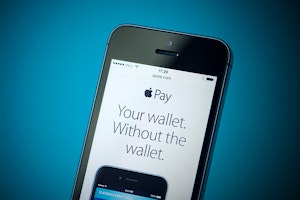
How to Protect Yourself from 6 Common Apple Pay Scams
Apple Pay may be a convenient way to send money, but it's also become a favorite among scammers looking to make a quick buck at your expense.

Apple Support Scam: Beware of Callers Impersonating Apple
If you receive a phone call from Apple Support, it could be a scammer attempting to steal your information and access your accounts.

Beware of Fake Apple Phishing Emails: Don't Click Any Links
If you've been notified that your Apple ID has been locked, don't click the link in the email as this could be an attempt to steal your password.

Tinder Code Scam Leads to Monthly Porn Subscriptions
The Tinder safe dating scam tricks users into giving up their credit card info to verify their profiles and leads to auto-enrollment in monthly subscription-based porn sites.

Apple Gift Card Scam: Red Flags of Imposters After Your Money
Whether it's the IRS, Social Security office, or a relative, be careful with anyone asking for payment via an Apple gift card—it's likely a scam.

How Do You Beat Gift Card Scams? Never Pay Using Gift Cards
Beating this scam is simple—don't pay for anything using gift cards and don't give anyone you don't know or trust your gift card information.
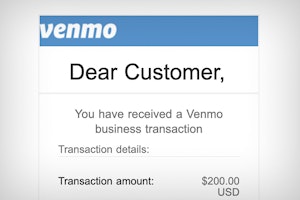
Selling on Facebook Marketplace? Beware of Fake Venmo Emails
Scammers are sending fake Venmo emails to Facebook Marketplace sellers in an attempt to steal login information and money.
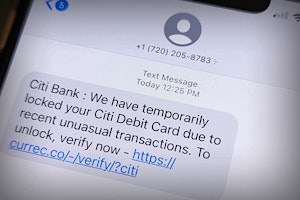
Citibank Text Message Scam: Locked Debit Card Alert Is Fake
If you've received a locked debit card text message from Citibank, it's likely a scam. Don't click on the link and delete the text message.
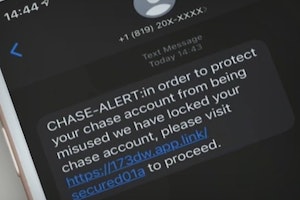
Real Chase Fraud Text Alert or Scam Message?
If you receive a text message from Chase Bank, don't click on any links or call the phone number listed—it could be a scam designed to steal your information and money.
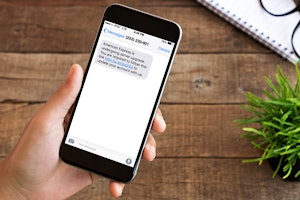
Amex Fraud Text Alert Scams: Spotting a Fraud
If you receive a text message from American Express, don't click on any links or call the phone number listed—it could be a scam designed to steal your information and money.
Guides To Protect Against Computers & Technology Scams

Best Password Managers for 2023: Editor's Picks
Keeping your accounts secure means having a unique password for each one which is difficult unless you use a password manager.

New Apple Pay Text Scam Claims Account Has Been Suspended
Multiple text message scams are circulating around the world which claim that your Apple Pay has been suspended. We provide multiple examples of this scam and how to avoid this Apple Pay scam.

McAfee Scam Email Claiming That Your Device is At Risk
Phishing emails from scammers posing as McAfee are attempting to steal your private information such as credit card details, account logins, social security number, date of birth and more.

Identity Theft: The Best Identity Theft Protection Services
Over 1.4 million Americans reported being victims of identity theft in 2021. With the rapid rise of identity theft, it is now more likely that you will become a victim of identity theft than to have your car stolen.

Real or Fake Apple Watch? 8 Ways to Tell the Difference
Although a lot of work has been done to remove counterfeit Apple products from shelves and online stores, fake Apple watches are still easy to come by.
News About Computers & Technology Scams

Apple Fights Back Against Counterfeiters on Social Media
Apple creates a team for the sole purpose of removing fake products from social media sites.

Urgent CDC Warning: Eye Drops Linked to 3 Deaths, Loss of Vision
The CDC is warning eye drops users of a rare bacterial infection from 2 brands of eye drops. The infection is resistant to antibiotics and has resulted in the loss of vision, loss of eyeballs and the death of 3 patients.

Banks May Refund More Zelle Scam Victims in 2023
Zelle scams have reached a serious volume. New reports suggest that banks are looking at new refund protections for customers in 2023.

Optus Data Breach - One of the Worst Cyberattacks in Australia
Hackers have gained access to 9.8 million customer records from Optus in Australia, exposing personal information such as driver licence, medicare and passport details.

Roe vs. Wade Overturned: Abortion Rights in Your State
Find out what the overturning of Roe vs. Wade means for abortion rights in your state.